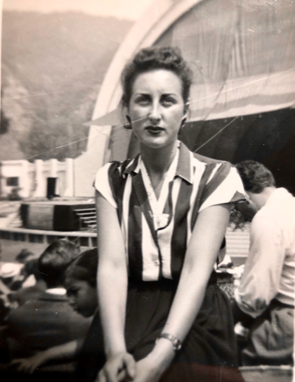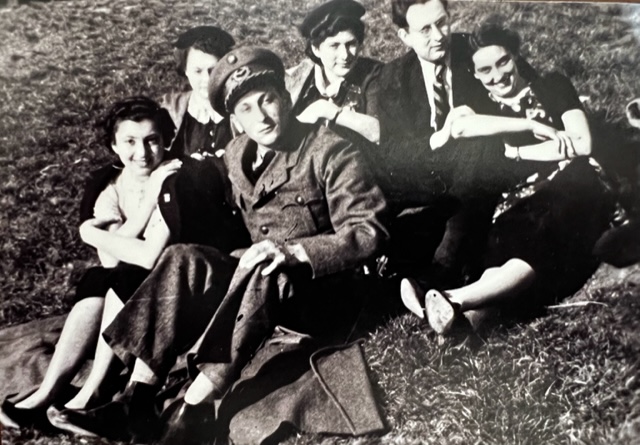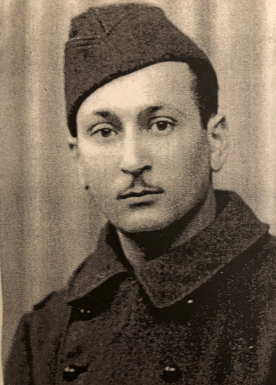Here are two excerpts from Gregory’s Breuer’s parents journals. His mother’s depiction of the Marche is included in her 400-page journal, and contains vivid descriptions of the hike up the mountains. The man she would end up marrying (his father, whom she met a few months earlier in St. Martin Vésubie) stayed behind to reunite with his sister, who came from Nice to escape as well. His journal excerpt describes their trek up the mountains to follow the main group.
From Manya Hartmayer’s Journal
Every day, new rumors came from the bus stop via Nice. “Die Deutschen sind da”: “The Germans are coming.” There was hardly a day of peace. Every one of us was ready to go, but to where? In front of us there were the mighty Alps leading to another foreign land (Italy). Then, it really happened. Overnight, the Italian soldiers left St. Martin. We awoke in the morning and our wonderful protectors were gone. Papa immediately said, “Let’s go!” I looked up in front of us at these huge mountains, and said to Papa, “Is THAT where we are going?” I couldn’t believe it. We were wearing city clothes! But I grabbed my low shoes, and put my one pair of high heels on a belt around my waist. We took only the bare essentials—some food and clothes. I stalled Papa to wait for Ernst, since he wanted to come with us. He arrived at the last minute, and told us to go ahead because he was waiting for his father and sister Lisl to come up from Nice. He would catch up with us later. I begged Papa to wait for them, but he would not even listen to me. “Let’s go!” and that was it. How can l ever describe my state of mind? I was leaving behind a very ill mother in a camp, and parting from a man you love. This is how I left St. Martin Vésubie, in the autumn of 1943. The little place was where we had expected and so hoped to see our mother again, and find some peace. It was a little heaven from an insane world. Such misfortune. We had to leave it.
The Alps stretched out in front of us. At first, I was going mechanically, like it wasn’t even me. But, pretty soon, the tremendous trauma of not knowing what was going to happen to you took over. I looked at my father. His face was like chiseled iron. He seemed to have lost all feeling, like a soldier in battle. The only difference was fighting without weapons, and he was not going to lose this time. When we left, there was a long line of people in front of us, and many people behind us as well. Old, young, sick, crippled, babies in their mothers arms—they were helped along. I kept on thinking, “Did the children of Israel coming out of Egypt feel as we did?” But there was no Moses to guide us. We climbed higher and higher and lost track of time, reason, or any other normal thinking process. The only thing that kept us moving in spite of the tremendous energy consumption was, “The Nazis are NOT going to get US!” The long line of the human chain moved toward the top. I cried bitter tears coming down, falling on the rocks with every step that separated me from my Mom. I had a big problem. Since the flat shoes I had on were not even my size, the sole loosened on the front and seemed to come off. One refugee saw me struggle with it and came with a piece of wire to “fix” it. He wound it around the shoe so that I wouldn’t lose the sole. It seemed to help a little, but not much. My brothers Sigi and Willi turned back many times to give a hand to a struggling mother or child. Each time I looked back, I saw my brothers struggling up the mountainside with somebody they were helping. The higher we got, the more we could look back on the beautiful panorama of the majestic Alps. A little lake we had passed some time ago, looked now like a gorgeous emerald glistening in the sun way below us. When I stopped to catch my breath for a moment, I wondered, “Was it really possible?” Such incredible beauty all around us of God’s wonders, and we were no part of that. We were outcasts, refugees, running, ever running for our lives. We finally came to the summit. We encountered some Italian soldiers who didn’t know, themselves, what to do. There were some primitive horse stables with straw in them. Some refugees fell down for a rest. Papa and my brothers and myself found a corner where we and the family Hochner (Giselle Hochner was my girlfriend from Luchon) fell asleep.
We were awakened at dawn by loud screaming. “Die Deutschen! Die Deutschen! The Germans are coming!” I have never seen such a desperate chaos as that which followed. Everybody jumped up like they were bitten by snakes, scrambling out of the barn. We were running for our lives. Higher into the Alps we fled. We had advanced quite a bit higher when I overheard Mr. Hochner saying to my Dad, “Hermann! I forgot my handkerchief in the straw, with my whole fortune in it. “He had put it under the straw near his head, filled with jewels and money, and in the panic had left it behind. The man was devastated. “How will I keep my family alive?” he kept on saying. The rest of the trip was a nightmare. When we finally reached the top, some people plain gave up and went back. There were rumors that the Nazis were waiting for us on the other side. But, we kept on going. This time, it was descending the steep mountainous terrain. It was like putting on brakes with every step, through my legs. It took a huge toll on the body. Of course, we became very very tired. We had to rest at frequent intervals. I was becoming a machine that was wound up to run like kids would wind up a toy to jump or run. There was no feeling left in me. Finally, we could see below us a highway. All of the sudden I was marching that very highway myself. My shoes had finally given out, and I had to throw them away. The white wool socks I was wearing and had knitted myself in St. Martin, were quite fancy with beautiful floral designs I had added on either side, were soon covered with dirt and blood. I had hurt my knees and calves on very sharp rocks. It was a bloody mess. Funny, I felt nothing. All I wanted was to lay down. People were in front of us and behind us. Papa was on my side. Willi and Sigi were in front of us. I looked up. Where were we going?
Nobody said a word. It was dusk, and I finally looked at the people around us. There were women with children, babes in arms, old men and women, and I saw a tall male with an army sack on his shoulder, with what looked like a young woman at his side. Something about him looked very familiar. He was wearing a basque cap just like a French soldier. He walked—Oh my God! Like Ernst! I ran towards him. “Ernie! Ernie!” I yelled at the top of my lungs. In a split second I was in his arms. His sister Lisl was with him. She had risked her life to travel from Nice to San Martin to be with her brother. Their father could not make it. Here they were, right in front of me. Ernst, of course, after we had left St. Martin, took Lisl to climb the mountain after us. He asked every refugee he encountered, “Have you seen Manya?” Somehow, he ended up at the same time, on the highway we took and we found each other again. We were now a bigger family. I, liked Lisl instantly. She was gorgeous, inside and out. She looked so fragile in her beautiful stylish clothes, but turned out to be quite tough. Her resemblance to the movie star Heddie Lamar was striking. She had worked as a ballerina, and lived in Italy before the war. So, she spoke fluent Italian. What a Godsend. She was such a big help to us. As we marched on the same highway together, there were rumors that the Germans had been seen nearby. A lot of people turned back again. Ernst talked my father into taking refuge on another part of the mountain away from the crowd. We had no idea where we were. It was just as if suddenly we were on a highway, and suddenly everyone we encountered spoke Italian. We headed off on our own, in a different direction from everyone else. We started mounting again. Up Up Up. It started to rain, and would not let up. As we headed toward nowhere, a nasty chill came through our summer clothes. My stomach turned and churned like crazy. I had visions of a hot meal. I kept on thinking, “If only we had SOMETHING to eat!” Ernst brought us higher and higher. We ran into some peasants. My papa, with Lisl as translator, exchanged his wedding band for a piece of canvas for us to hold over our heads to protect us from the streaming rain. As I held onto one piece of canvas while the rain was streaming down my arm, we must have been a very strange sight. All of us were holding one canvas over our heads.
Finally the rain stopped. I found a brook. While everyone else rested, I washed some of my things, and Willi’s shirt, in the ice cold water. In the middle of my washing, my brother’s shirt, I heard Sigi’s voice at the top of the hill. “Manya! Schnell! Hurry up! We have to run! We have to leave!” And off we were running again. We found a little empty church with long wooden benches that looked SO inviting! We all just stretched out on them, wet and all. Up there, we saw a town stretched out way below us. Later on, we found out that the name of the town was Bergemolo. A lot of our people were taken and rounded up there for deportation, we found out later. It was a Nazi headquarters. After all the hardship and escape, most were brought in cattle cars to Poland, Auschwitz, Birkenau, Treblinka. The peasants already warned us about those horrible camps. We knew now for certain that we were running for our lives. While everybody rested up in the little church, I stepped out and walked around for a moment.
Manya Hartmayer
From Ernst Breuer’s Journal
They [the St. Martin refugees] all had left the next morning around five o’clock in a long column toward Italy. I had to stay behind awaiting the prepaid car with my dad and sister.
I went up the hill to observe the town-square where the car or even the Germans would have to arrive. To my surprise, I found Charley on the same spot waiting for Marisa, who had gone to Nice for an emergency dental treatment. The town seemed empty with hardly any sound, not the way it had been just a couple of days before. After waiting long hours a car finally arrived. I said good-bye to Charley and rushed down to meet my father and sister. My father was not there, only my sister and a strange couple she had taken along instead. I was devastated, first my Mother and now possibly my Dad. What to do? Should I go back, stay or continue. I decided to continue forward. We started marching and climbing right away. I noticed a few people who apparently had not joined the exodus in the early morning following us. I still remember two elderly men and two young women with small children. At a particular steep spot I carried the children over. We kept on climbing for hours. My sister Lisl, who to my knowledge, never hiked, climbed or was active in any sport except Ballroom dancing, was a real trooper. She stayed right behind me without complaining. Lisl and I reached the top of the mountain alone because the others had disappeared.
Soldiers on a military post guarding the border welcomed us. They assured us that no German would be allowed to pass and they pointed smiling at a few machine guns and a small artillery piece. We finally reached the bottom in the evening, a very small area with rock walls, almost going straight up. There was only a small path leading into the area from the North and continuing on a bridge over a river to the South. The bridge was guarded by the military allowing no one to pass. There was also a small hotel. I rented a room and Lisl talked to the owner asking questions, translating to to me. We learned that the Military were only waiting for an order to retreat.
I sent LisI to rest in the room while I posted myself below to watch the bridge.
Sure enough in the middle of the night they left. I went to get my sister and we crossed the bridge and started walking again. All of a sudden, not quite morning yet, I noticed people walking behind us and in front of us. And then someone grabbed Lisl walking beside me from behind, hugging and kissing her without really knowing her. It was Manya. Then we kept on walking together again until we reached a town called Valdieri in the mid-morning.
After miles of trekking in the steep mountains and unknown terrain, many people lay by the road exhausted. I went with LisI to interview some locals to get information. I asked them about the best way to get back up into the mountains in the other direction. It was now the middle of October and they told us we would freeze up there. However, I was determined not to stay longer then necessary with hundreds of other refugees in one place. I took Hermann aside and explained the situation including what Lisi and I had learned talking to the townspeople. He shared my concern, but seemed to trust the wisdom of the leaders who had arranged the march, more than what I had to say.
We rested a little longer. He approached me again and we talked some more. I could not possibly remember exactly what was said but I must have reinstated that staying meant a disaster waiting to happen. Retreating into the mountains would mean winning some more time. He finally came over to my side and we started together on the path pointed out to Lisl and myself by the townspeople.
Ernst Breuer




